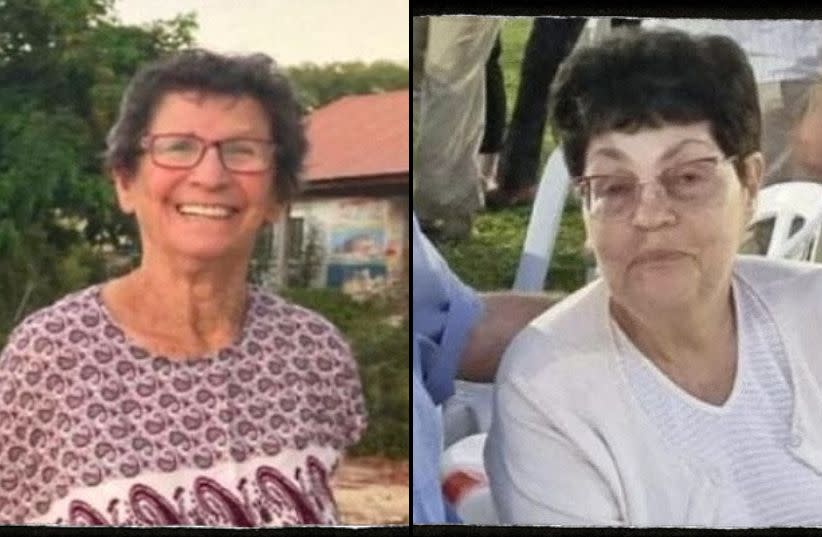Freed Israeli hostage Yocheved Lifshitz: Hamas beat me with a wooden pole
An elderly Israeli hostage who was released by Hamas overnight said she was beaten by terrorists as she was taken into Gaza on October 7, but was then well-treated during her two-week captivity in the Palestinian enclave.
Yocheved Lifshitz, 85, was one of two women freed late Monday, leaving around 220 hostages still in the hands of Hamas.
Seated in a wheelchair, a frail-looking Lifshitz told reporters that a doctor had visited her while she was held in a network of tunnels within Gaza and that all her needs had been taken care of.

“I didn’t think we would reach this situation. They went wild,” the former captive told reporters. “They blew up the fence we built for two and a half billion dollars. They attacked our houses. They killed and kidnapped both old and young with no distinction.”
Lifshitz described the situation as a “nightmare we couldn’t have imagined” and one that she keeps “repeating in my mind.”
When they captured her, she said, they put her on a motorcycle with her legs tied on one side and her head on the other and then raced her through the fields. There were motorcycles on either side and also one behind.
“As we rode, the motorcycle rider hit me with a wooden pole,” Lifshitz recalled. “They didn’t break my ribs, but it hurt me a lot in that area, making it difficult to breathe. They stole my watch and jewelry while I was on the motorcycle.”
She was at first held in Abasan al-Kabira, near Kibbutz Be’eri and Khan Yunis in the southern Gaza Strip. After that, she did not know to where she was taken.
“Eventually, we went underground and walked for kilometers in wet tunnels, for two or three hours in a spider web of tunnels,” she recalled. “We went through the tunnels until we reached a large hall. We were a group of 25 people, and they separated us according to which Kibbutz we were from. There were five of us from Kibbutz Nir Oz.”
Hamas assigned a guard for each prisoner, according to Lifshitz. The guards spoke with their prisoners and ate with them. They said they did not want to talk about what happened. In addition, a doctor would come each day and examine the hostages, as well as provide them with medications as needed. She said they took good care of the wounded.
“There was a person with us who was injured in the hands and legs when they brought him on the motorcycle; it was heartbreaking to see that,” Lifshitz recalled.
It is unclear if people from other kibbutzim are receiving the same treatment as those in Lifshitz’s cell.
“They were very concerned with hygiene and were worried about an outbreak of something. We had toilets which they cleaned every day,” she continued.
Lifshitz said the IDF was not prepared for the events of October 7.
“Three weeks ago, masses arrived at the fence. The IDF did not take it seriously,” she charged. “We were left to fend for ourselves. The lack of knowledge in the IDF and the Shin Bet severely affected us.”
She said, in contrast, that Hamas seemed prepared for the massacre it carried out.
“They prepared for this for a long time,” she said.
Husband still being held captive
Hamas said on Sunday that it released Lifshitz, and a second woman, Nurit Cooper, 79, on health grounds, after taking them and more than 200 others hostage during Hamas’s October 7 massacre, in which terrorists killed at least 1,400 people.
Lifshitz and her 83-year-old husband, Oded, were kidnapped from their home in Kibbutz Nir Oz, close to the border with Gaza in southern Israel. Oded is still in captivity.
The just released former hostage is a peace activist who together with her husband helped sick Palestinians in Gaza get to hospital for years.
“They are human rights activists, peace activists for all their life,” grandson Daniel Lifshitz told Reuters in Tel Aviv shortly before the release of his grandmother was confirmed. “For more than a decade, they took… sick Palestinians from the Gaza Strip – not from the West Bank, from the Gaza Strip – every week from the Erez border to the hospitals in Israel to get treatment for their disease, for cancer, for anything.”





Comments are closed.